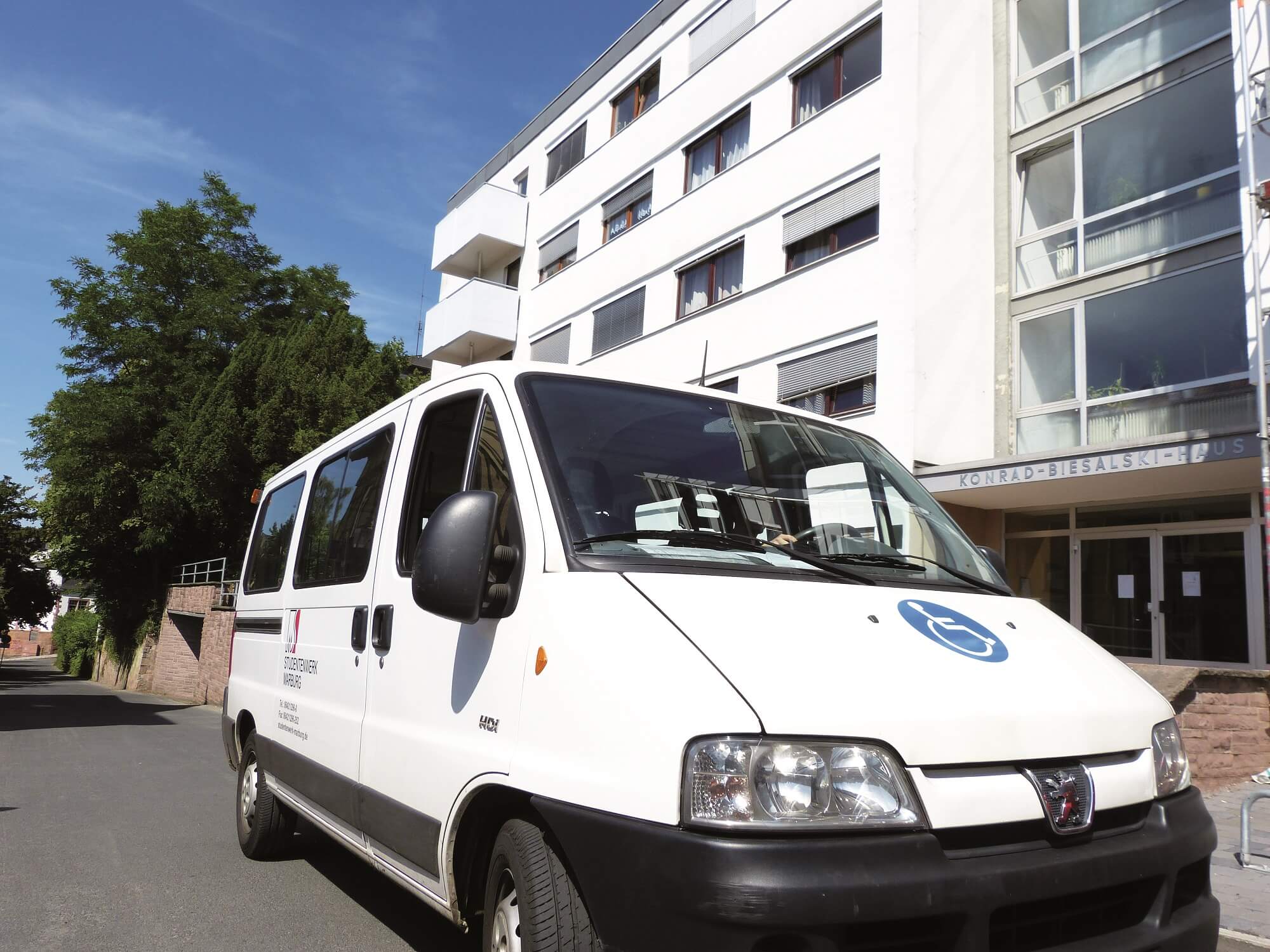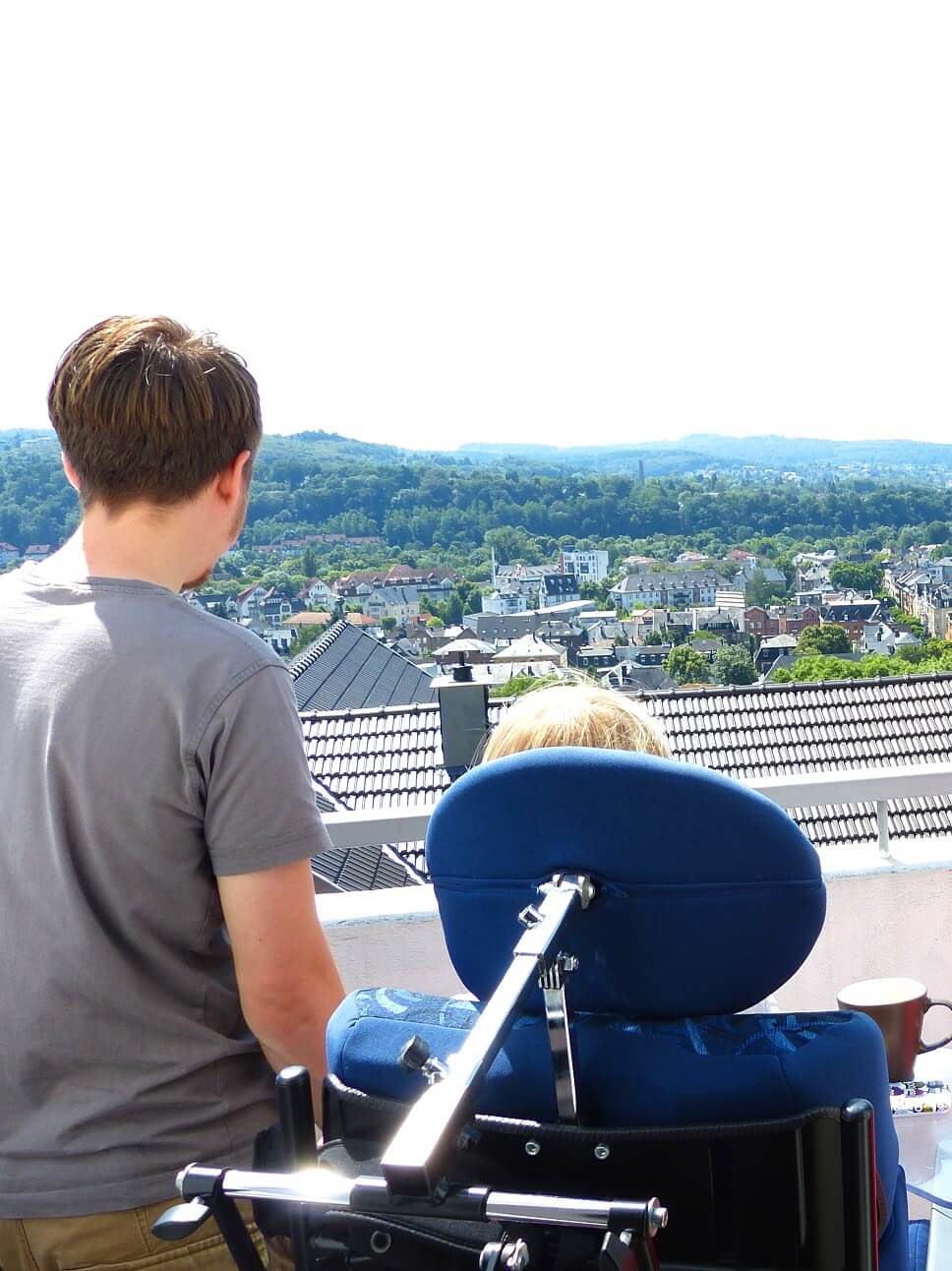- Vorherige Seite
- Home
- Advice and Assistance
- Studying with a Disability
- Daycare for children of the Studentenwerk Marburg
- Psychotherapeutic Counselling Centre for Students (PBS)
- Social Counselling
Studying with a Disability

The Studentenwerk Marburg offers different services to students with disabilities to allow them to go about their daily study life as independently as possible. This includes, alongside the advisory service and canteen assistance, the facilities at the integrated student residence in the Konrad-Biesalski House. Here students with and without disabilities live together. In the following we will give a short overview:
Offers from the Studentenwerk Marburg
Konrad-Biesalski House
Inclusive living for students with disabilities - stationary facility for integration assistance.
We are
An inclusive student residence in which students with and without disabilities live
We offer
Individual assistance and help to optimise the begin of study for students with disabilities.
All of our cared for students are - as well as their non-disabled fellow students - free in organising their daily routine and study.
Autonomy and inclusion are the guiding principles that determine how we act.
Our range of services
In a barrier free single room with an assistance call system, we offer a needs based service. Depending on the wishes of the students we offer advice, assistance, support, guidance, and comprehensive assistance in the following areas:
- day to day living e.g. grocery shopping and laundry
- basic individual care e.g. personal hygiene and diet
- participation in cultural and social life e.g. transport and company to events
We organise assistance services for a regulated course of study
- assistance during course of study
- writing aid and
- transport service
Our own bus transport service with wheelchair-accessible vehicles is available to our residents from 7.30 a.m. until 11.30 p.m. The transport to lectures or to the canteen etc., or to private appointments within Marburg is guaranteed.
Services are available to our residents 24 hours a day on call. It is important to us that your personal privacy is protected and that you can call us at any time for support.
Contact:
Everything about living:
Studentenwerk Marburg
Erlenring 5, 35037 Marburg
+ 49 (0) 6421/296-140 (Hans-Peter Hardt)
+ 49 (0) 6421/203-299 (Sabine Hügel-Bleser)
wohnen@studentenwerk-marburg.de
www.studentenwerk-marburg.de
Further Assistance
Information point for students with disabilities at the Philipps-Universität Marburg
Here you can receive information about studying, in particular:
Information for persons with hearing impairment
Information for persons with visual impairment
Information for persons with physical disabilties
Housing for students with disabilties
Other important addresses for students with disabilities
Contact: service centre for students with disabilities (behinderte Studierende (SBS))
Kontakt: Servicestelle für behinderte Studierende (SBS)
Other addresses for students with disabilities:
- Sozialberatung des Studentenwerks Marburg
- Psychotherapeutische Beratungsstelle
- Behindertenreferat im AStA Marburg
- Deutsche Blindenstudienanstalt e.V.
- Deutsches Studentenwerk Informations- und Beratungsstelle Studium und Behinderung
- Deutscher Verein der Blinden und Sehbehinderten in Studium und Beruf e.V.
- Bundesarbeitsgemeinschaft Hörbehinderter Studenten und Absolventen e.V.
- Verein zur Förderung der Inklusion behinderter Menschen e.V.
Scholarships
Within the talent programme a course of study can be partly financed through scholarship grants. These modalities depend on the funding from the different organisations. In addition, there a number of further institutions that support different groups of students. More information an be found under:
Particular circumstances under which university places are given to students with disabilities.
Application for restricted courses of study
Students with disabilities or with chronic illnesses that are interested in applying for a restricted course of study can also apply for special circumstances, which help compensate disadvantages due to disabilities. For further information see the Foundation for University Admissions (Stiftung für Hochschulzulassung):
Consideration for the first place of study
Applications from students with a severely disabled pass can expect that the Foundation for University Admissions will fulfill their wishes regarding place of study. Without a severely disabled pass a request can be made for priority consideration for a preferred place of study. Furthermore, there is a possibility to apply for the following special requests:
Hardship applications:
With a hardship application, applicants that find themselves in difficult circumstances will be accepted into their course of study straight away. Only the certificate of servere disability alone will not suffice for the recognition of a hardship application. Medical conditions have to be verified with a specialised medical report. Special circumstances include, for example, an illness showing a trend towards worsening of condition which implies that the future course of study will be difficult to endure. In these cases an acceptance is immediate.

The Studentenwerk Marburg supports the creation of a place with equal opportunities for students with disability and chronic illness.
Advice for students with disabilities and chronic illnesses empowers these students to lead an independent and equal study life without outside help. They are able to handle challenges well and take part in life at university.
15.7% of students at Marburg study with a health impairment - quite often their handicap can impede their studies. The results of a nationwide study show that students in Germany with disabilities suspend their studies more often than students without disabilities. (27% vs. 8%) and study longer (7.9 vs. 6.8 semesters).
In the past years many efforts have been made to give people with disabilities and chronic illnesses the same chances at university. This has led to considerable improvements in their study situation.
However, students with disabilities and chronic illnesses still have to compensate for the many structural deficiencies at university and overcome existing barriers.